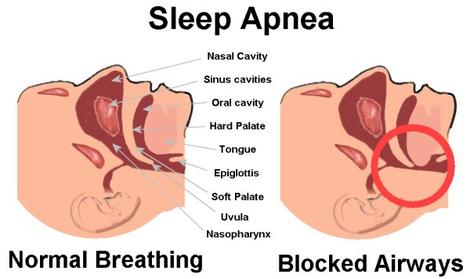Atrial Fibrillation and Sleep Apnea
Sleep Apnea is a common disorder in which you have one or more pauses in breathing or shallow breaths while you sleep.
In obstructive sleep apnea, your airway collapses or is blocked during sleep. When you try to breathe, any air that squeezes past the blockage can cause loud snoring. It is, however, much more than simply snoring, as it can have serious detrimental effects on your health.
Breathing pauses can last from a few seconds to minutes. They may occur 30 times or more an hour. Typically, normal breathing then starts again, sometimes with a loud snort or choking sound.
As a result, the quality of your sleep is poor, which makes you tired during the day. Sleep apnea is a leading cause of excessive daytime sleepiness.

In patients with sleep apnea, the airways are blocked during sleep, causing periods of apnea (no breathing)
Sleep Apnea and Atrial Fibrillation
Sleep Apnea is associated with an increased risk of many cardiovascular conditions. It increases the stress in your heart. It is associated with an increased risk of hypertension, congestive heart failure, heart attacks, strokes, diabetes, obesity, and atrial fibrillation.
It is well known that there is a greater risk of atrial fibrillation among those with obstructive sleep apnea. Sleep Apnea causes progressive dilatation of the atria and makes one more prone to AFib and AFib recurrences after treatment. AFib patients with untreated sleep apnea are more likely to revert back into AFib after electrical cardioversion and even after an AFib ablation than other AFib patients without sleep apnea.
Treatment of Sleep Apnea
There is treatment for sleep apnea. Patients need first to be screened and then have a formal sleep study if indicated. For those diagnosed with sleep apnea, weight loss, and some lifestyle modifications can help. Most patients are treated with CPAP.
What is CPAP?
CPAP, or continuous positive airway pressure, is a treatment that uses mild air pressure to keep the airways open. CPAP treatment involves a CPAP machine, which has three main parts:
- A mask or other device that fits over your nose or your nose and mouth. Straps keep the mask in place while you’re wearing it.
- A tube that connects the mask to the machine’s motor.
- A motor that blows air into the tube.
CPAP has many benefits. It can:
- Keep your airway open while you sleep
- Correct snoring so others in your household can sleep
- Improve your quality of sleep
- Relieve sleep apnea symptoms, such as excessive daytime sleepiness
- Decrease or prevent high blood pressure
Many people who use CPAP report feeling better once they begin treatment. They feel more attentive and better able to work during the day. They also report fewer complaints from bed partners about snoring and sleep disruption.
Atrial Fibrillation (Afib) is a condition that can impact your quality of life and cause strokes. Afib treatment should be individualized to meet each patient’s needs.
Dr Jose Osorio
Miami, FL
Read More About AFib:
